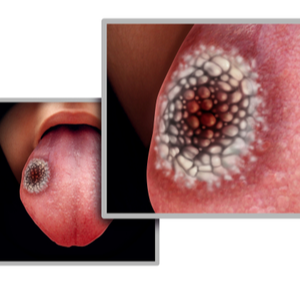
What is lingual carcinoma?
Lingual carcinoma is also colloquially called tongue carcinoma. It is a rare malignant tumour in the tongue area, which mainly affects the back third of the tongue and, even more rarely, the front part of the tongue and the undersurface of the tongue. Excessive nicotine or alcohol consumption and other orally ingested drugs favour the development of lingual carcinoma. Inadequate oral hygiene can also contribute to the development of lingual carcinoma. If lingual carcinoma is detected early, there is a good chance of a cure.
What form does lingual carcinoma take?
Lingual carcinomas are usually squamous cell carcinomas (malignant skin tumours) and occur either in a flat or cauliflower-like shape. If a lingual carcinoma is already far advanced in its growth, it can also affect neighbouring cells, such as the lymph nodes in the neck, the lower jaw or the larynx.
What are the causes of lingual carcinoma?
Doctors are still divided about the exact causes of lingual carcinoma. However, it is certain that the following factors can increase the risk of developing lingual carcinoma:
- Smoking,
- high alcohol consumption (especially of high-proof spirits),
- Viral infections (especially HPV),
- chronic inflammation of the mucous membranes of the mouth and tongue,
- insufficient oral hygiene.
What are the symptoms of lingual carcinoma?
Affected people who suffer from lingual carcinoma hardly experience any symptoms, especially in the early stages. Later, however, the following mostly non-specific symptoms can occur:
- burning pain in the mouth and/or throat area, which becomes stronger especially when swallowing
- Pain or discomfort when swallowing
- Foreign body sensation in the mouth and/or throat area
- Sore throat that can radiate into the ears
- increased salivation
- restricted mobility of the tongue
- Bad breath
- Problems with articulation
- bleeding on the underside of the tongue
- enlarged lymph nodes in the neck and/or lower jaw
How is lingual carcinoma diagnosed?
If a lingual carcinoma is suspected, the person concerned should consult a specialist in ear, nose and throat medicine or a specialist in oral and maxillofacial surgery. The respective specialist will first take the patient's medical history and thoroughly examine the mouth and throat, possibly with the aid of a mirror. If the suspicion of a lingual carcinoma is confirmed, a tissue sample is taken from the changed skin area. Ultimately, the suspicion of lingual carcinoma can only be confirmed by endoscopic examination of the tissue sample (biopsy). Further imaging procedures such as an ultrasound examination, a computer tomography (CT) or a magnetic resonance imaging can determine how far the tumour has already developed. This knowledge plays an important role in further treatment.
How is lingual carcinoma treated?
The treatment of a lingual carcinoma always depends on the size of the tumour and its extension. In addition, it must be taken into account whether the tumour has already metastasised and what the patient's general state of health is. With all possible treatment options, the doctor will always try to preserve the functionality of the tongue and the other affected cell structures as much as possible. The following therapeutic measures are generally considered:
- Surgery: is usually performed when the tumour can be removed as completely as possible surgically. In the case of a surgical intervention in the tongue area, a laser is usually used. In this case, possible metastases, for example in the neck area, can also be removed.
- Radiotherapy, or combined radiotherapy and chemotherapy: is usually used for very advanced tumours that cannot be completely removed
- Targeted therapy: this includes modern medicines such as monoclonal antibodies (e.g. cetuximab), which are specifically targeted at the particular cell structure of the tumour tissue in order to destroy it or slow down its growth
- Plastic reconstruction: this treatment method is used especially in advanced cases that are accompanied by swallowing disorders and/or speech problems. The damaged or removed structures are then surgically replaced to ensure at least speech function, chewing and/or swallowing.
- Psychological support: is offered to those affected to help them cope with the disease and the associated problems and/or impairments.
What is the aftercare for lingual carcinoma?
Rehabilitation should follow directly or as soon as possible after the treatment has been completed. For this purpose, the person concerned can turn to special after-care clinics that are not only familiar with the physical but also with the psychological problems of a cancer disease. In addition to these aftercare clinics, cancer patients should also attend regular check-ups. These are necessary in order to detect and treat possible cancer neoplasms at an early stage.
What is the prognosis of lingual carcinoma?
The 5-year survival rate for patients with a lingual tumour is up to 25 percent. The 5-year survival rate of patients who have a tongue margin tumour is between 35 and 50 per cent.
